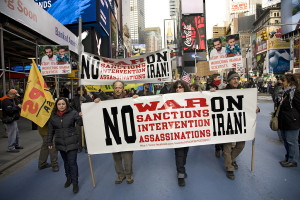Creatively Removing Sanctions Against Iran
Navid Hassibi and Tom Sauer examine creative ways of removing sanctions against Iran.
[analysis] As marathon talks on the Iranian nuclear program resume, the timing and manner in which the international community might lift the sanctions against Iran will increasingly come to the fore, particularly because of the players’ conflicting views of the situation. Since reaching a political framework agreement last month, officials involved in the negotiations have made starkly contradictory statements regarding sanctions relief. Indeed, the latest round of discussions in New York focused on the adoption of a UN Security Council resolution that would sort out the differences among the P5+1—the United States, Russia, China, the United Kingdom, France, and Germany—and Iran on the lifting of sanctions.
Originally, the United States insisted that the sanctions be removed gradually, in a phased approach, although President Obama indicated his openness to creative solutions that would be “more acceptable” to Iran’s many different political constituencies. He also stressed that his priority was to create a system for re-imposing punitive measures if Iran is found to be non-compliant: a so-called “snap-back provision” that would not be subject to a veto by other members of the UN Security Council. US officials are now softening on gradualism, and indicating that somewhat swifter relief from US sanctions may be possible once Iran complies with the initial parts of the deal.
Iranian Supreme Leader Ali Khamenei, however, has insisted that all sanctions be removed immediately once a deal is reached, a call echoed by Iranian President Hassan Rouhani. Pivoting off of these statements, Iranian Foreign Minister Mohammad Javad Zarif told an audience at New York University two weeks ago that within a few days of a final agreement, the UN Security Council should lift all UN sanctions, with no snap-back provision.
For more, please visit the Bulletin of the Atomic Scientists.
Related posts:
Category: FOREIGN POLICY & SECURITY, INTERNATIONAL LAW & HUMAN RIGHTS, MIDDLE EAST, POLITICS





